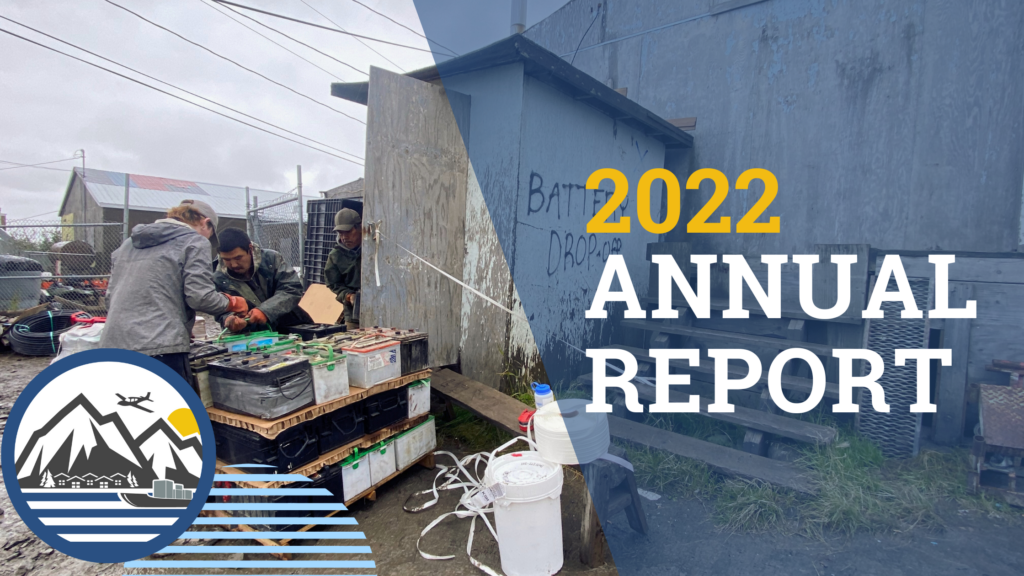
The year 2022 marked a significant phase of growth and impact for Backhaul Alaska, showcasing our commitment to safeguarding Alaska’s environments from hazardous wastes. Thanks to our dedicated team and the robust support from our partners, we have expanded our reach and refined our processes to meet the unique challenges faced by rural communities.
The Backhaul Alaska Program (BAP) initiated its journey with a two-phase pilot from 2018 to 2021, focusing on the collection and shipment of challenging waste materials like e-scrap, universal waste lamps, and lead acid batteries. Initially collaborating with 11 communities in the first phase and expanding to 17 more in the second, the program aimed to understand and address the unique backhaul needs and challenges across various Alaskan regions. By the end of the pilot, BAP facilitated the recycling of approximately 280,000 lbs of material from 23 communities, setting the stage for its ongoing implementation phase that started in 2022. This phase continues to support the original pilot communities and is developing hub-and-spoke networks to enhance regional waste management efficiency.
In 2022, Backhaul Alaska expanded its reach, serving a diverse array of communities. We re-engaged with all original pilot communities, ensuring they continued to benefit from our backhaul services. We also focused on enhancing our network of regional hubs. These hubs play a critical role in consolidating materials from surrounding areas, making our operations more efficient and effective.
We've utilized generous freight donations from Matson to bolster recycling efforts in the northern road system. Additionally, we explored establishing "mini hubs" along the lower Yukon River, aiming to improve service accessibility.
By year's end, our services touched 57 communities, with Backhaul Alaska's support now reaching a total of 73 communities. This expansion not only reflects our growing capacity but also our commitment to adapting and responding to the needs of Alaskan communities.


In 2022, the BAP significantly expanded its educational initiatives, offering five key training sessions aimed at enhancing safety and efficiency in hazardous material management. These sessions were attended by 76 individuals from 43 Alaskan communities, emphasizing practical skills in hazardous material regulations and best practices for safe backhaul operations. Highlights included specialized training in partnership with Kodiak Area Native Association (KANA) and targeted environmental job training for rural Alaskan communities. The comprehensive spread of training locations from Anchorage to Kodiak illustrates BAP's commitment to statewide educational outreach.
The BAP conducted site visits across numerous communities throughout 2022 to ensure effective waste management practices. These visits, led by either BAP staff or Regional Coordinators, are crucial for maintaining program integrity and addressing the unique challenges faced by each community.
Key Activities During Site Visits:
Impact of Site Visits: These visits not only reinforce best practices and compliance with hazardous materials regulations but also bolster local capabilities through hands-on training and technical assistance. This direct engagement helps communities better manage their hazardous wastes, contributing to the overall safety and environmental health of the region.

Regional Backhaul Partnerships The BAP partners with regional organizations to facilitate backhaul activities, including site visits, coordination of shipments, and technical assistance. These regional coordinators serve as vital links between the program and Alaskan communities, ensuring efficient communication and execution of backhaul activities.
Business Partnerships Significant contributions from Matson and the Responsible Battery Coalition (RBC) have supported BAP’s recycling efforts. Matson provided crucial freight donations, aiding the backhaul of substantial recyclable materials. RBC offered logistical support and recycling services, ensuring the proper handling of end-of-life batteries.
Additional Program Supporters The program has received substantial backing from environmental and governmental agencies, enhancing its capacity to manage hazardous waste effectively across Alaska. This includes ongoing support for training, technical assistance, and community engagement.
In 2022, the BAP leveraged Waste Management (WM) as the "Control Tower" entity to oversee the logistics and coordination of backhaul materials, optimizing transport methods and costs. By the end of the year, BAP transitioned to managing these duties internally with the aim to enhance efficiency. Throughout the year, BAP successfully facilitated the backhaul of approximately 460,000 lbs of materials, marking a significant increase from the pilot program's 280,000 lbs.

In 2022, the Backhaul Alaska Program (BAP) focused on refining its packaging practices through direct collaborations with industry partners. A key visit was made to Washington State, where BAP staff worked with Waste Management (WM) and Metro to assess and enhance packaging standards for backhauled materials, ensuring compliance and improving efficiency. Highlights from these engagements include:
These efforts are crucial for maintaining the integrity of materials during transport and ensuring they reach recycling facilities in optimal condition to reenter the circular economy.